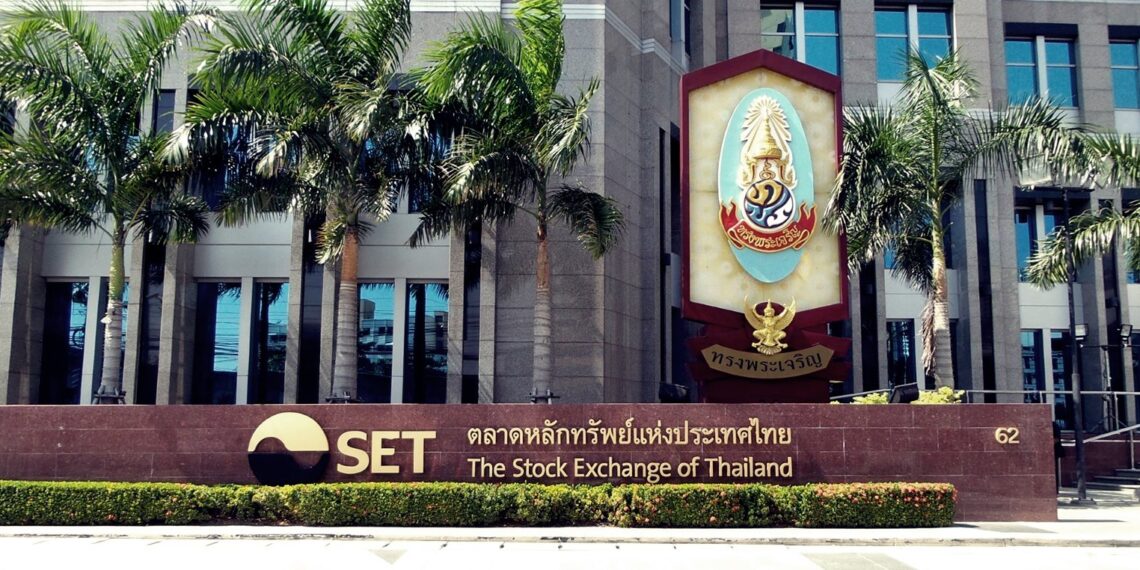No products in the basket.
The Thai stock market may face challenges and potentially lose its status as a leader in the Southeast Asian region.
Key takeaways
- The SET could lose its position as one of the leading stock exchanges in the SEA region
- The complex situation faced by the Stock Exchange of Thailand (SET) has resulted from a combination of legal and political factors.
- Sources reported that the size difference between the stock exchanges of Thailand and Singapore is narrowing, being $4 billion versus $25 billion a year ago.
Thailand is close to losing its position as one of the stock exchanges with the highest transaction volume to countries like Singapore and Malaysia. This decline is attributed to a combination of political and legal instability, weaker-than-expected tourism recovery, and allegations of corporate misconduct, leading to a 14% selloff in the benchmark SET Index over the past year.
Political uncertainty surrounding the potential removal of Prime Minister Srettha Thavisin from office, as well as delays in policy implementation, including an unpaid 450-billion-baht ($14-billion) cash handout, are also contributing to the negative market sentiment.
Recently, international sources reported that the size difference between the stock exchanges of Thailand and Singapore is narrowing, being $4 billion versus $25 billion a year ago.
Thai stocks are usually more expensive than Malaysian stocks. But in late May, the average price of Thai stocks became cheaper than Malaysian stocks for the first time in almost 4 years. Thai stocks are now selling for about 13 times their earnings, while Malaysian stocks are selling for 14.1 times their earnings.
The complex situation faced by the Stock Exchange of Thailand (SET) has resulted from a combination of legal and political factors.
These factors have led to a 14% sell-off in the SET index over the past 12 months, the largest drop among major global benchmark indices.
The total value of companies traded on the Thai stock market was $440 billion, while Singapore reported a value of $426 billion and Malaysia $422 billion.
The stock market currently leading the SEA region, with the highest valuation in company trading, has been Indonesia. It reported a trading amount of $749 billion, being considered the leader in the region.
To restore confidence in the financial market, the Thai stock exchange has launched various initiatives focused on transparency and preventing market abuse.
- The Thai government has approved measures to boost the local stock market, including increasing tax breaks and reducing lockups for individuals investing in sustainable funds.
- Investment applications in Thailand have risen by 35%, indicating a surge in projects in key sectors and reflecting investors’ confidence in Thailand as a resilient production base.
- The new chairman of the Securities and Exchange Commission (SEC) has outlined steps to revive Thailand’s slumping capital market.
- The Stock Exchange of Thailand (SET) has announced a 3-year strategic plan focusing on increasing market confidence, attracting investments, and developing infrastructure to meet global standards while supporting ESG initiatives and promoting financial literacy.
- To prevent market abuses and improve efficiency, Thailand’s bourse has launched new initiatives and reforms.
- Prime Minister Srettha Thavisin has unveiled initiatives aimed at revitalizing the capital market, focusing on sustainability and encouraging private sector fundraising.
How can external factors affect the performance of the SET?
The stock prices on the Stock Exchange of Thailand (SET) are influenced by various external factors that can cause significant fluctuations. Understanding these factors is crucial for investors and stakeholders to make informed decisions.
Global Economic Conditions
The global economic environment plays a pivotal role in affecting stock prices on the SET. Economic downturns or booms in major economies like the United States, China, and the European Union can lead to corresponding declines or increases in Thai stock prices. For instance, a global recession can reduce demand for Thai exports, negatively impacting companies listed on the SET.
Political Stability
Political events and stability within Thailand and neighboring countries can significantly impact investor confidence. Political unrest, changes in government policies, or geopolitical tensions can lead to market volatility. Investors seek stability, and any signs of political instability can result in a sell-off, driving stock prices down.
Exchange Rates
Fluctuations in the Thai baht against major currencies can affect the profitability of companies, especially those involved in international trade. A stronger baht can make Thai exports more expensive and less competitive, potentially reducing revenues for export-oriented companies. Conversely, a weaker baht can boost exports but increase the cost of imported goods and services.
Interest Rates
The monetary policy set by the Bank of Thailand, particularly interest rate adjustments, can influence stock prices. Higher interest rates can lead to higher borrowing costs for companies, reducing their profitability and, consequently, their stock prices. Lower interest rates, on the other hand, can stimulate investment and spending, potentially boosting stock prices.
Investor Sentiment
Market sentiment, driven by news, rumors, and overall investor confidence, can lead to short-term fluctuations in stock prices. Positive news about economic growth, corporate earnings, or favorable government policies can boost investor confidence and drive stock prices up, while negative news can have the opposite effect.
Discover more from Thailand Business News
Subscribe to get the latest posts sent to your email.














